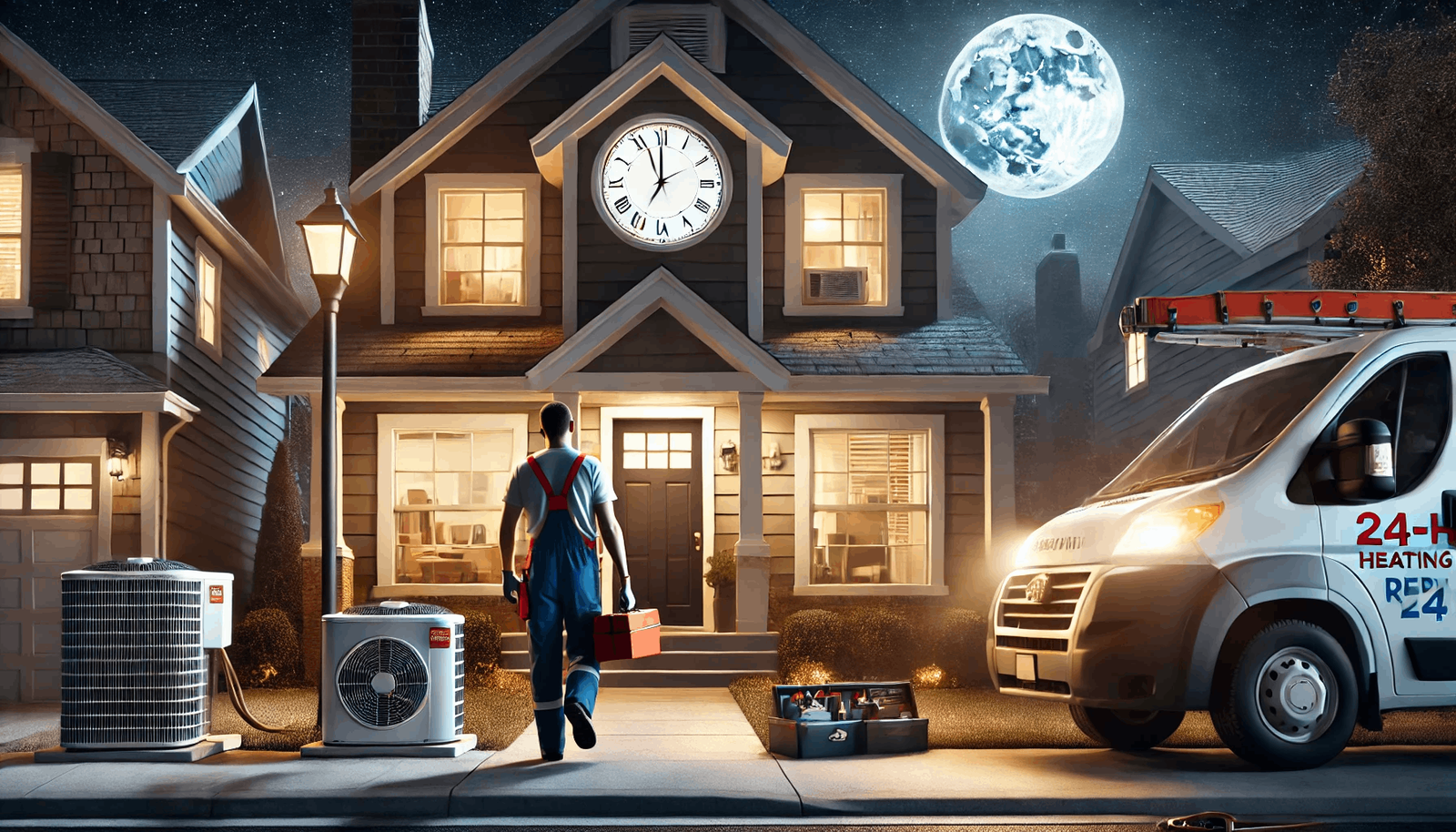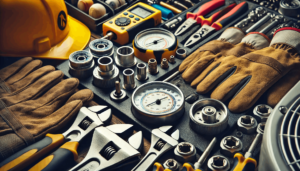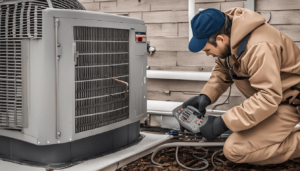Introduction
In today’s fast-paced world, having access to 24-hour heating and air conditioning repair services is more important than ever. When your HVAC system fails unexpectedly, it can lead to uncomfortable living conditions, increased energy costs, and even potential health risks, especially during extreme weather conditions. Whether it’s a sweltering summer day or a frigid winter night, knowing that professional help is just a phone call away provides peace of mind for homeowners.
Emergency HVAC services are typically needed in various situations, including:
- Sudden Loss of Heating or Cooling: If your heating system stops working in the dead of winter or your air conditioning unit fails during a heatwave, immediate repairs are crucial to maintain a comfortable indoor environment.
- Unusual Noises or Smells: Strange sounds, such as banging or hissing, or odors like burning or gas leaks, can indicate serious problems that require immediate professional attention to avoid further damage or hazards.
- Thermostat Malfunctions: When your thermostat is unresponsive or displaying incorrect temperatures, it can disrupt your HVAC system’s performance, necessitating urgent repairs.
- Leaks and Water Damage: If you notice water pooling around your HVAC system, this could signal a refrigerant leak or condensation issue, both of which need prompt attention to prevent damage to your home.
When to Call for 24-Hour HVAC Repair
Knowing when to seek 24-hour HVAC repair is crucial for maintaining a comfortable and safe living environment. There are several key signs that indicate your heating or air conditioning system requires immediate professional attention:
Signs Your HVAC System Needs Immediate Attention
- Unusual Noises: If you hear strange sounds coming from your HVAC system—such as banging, clanging, hissing, or screeching—it’s a clear signal that something is wrong. These noises can indicate issues like loose components, worn-out bearings, or refrigerant leaks that need prompt inspection.
- Lack of Heating or Cooling: When your heating system fails to produce warmth during cold weather or your air conditioning doesn’t cool effectively in the summer, it’s time to call for help. Inadequate heating or cooling can lead to uncomfortable living conditions and can signify a malfunctioning component.
- Burning Smells: If you detect a burning smell when your HVAC system is running, it could indicate overheating electrical components or burned-out wiring. This is a potential fire hazard and should be addressed immediately to ensure the safety of your home and family.
- Frequent Cycling: If your HVAC system is frequently turning on and off (short cycling), it may be struggling to maintain the set temperature. This issue can be due to problems with the thermostat, dirty filters, or more significant mechanical failures that require urgent attention.
- Water Leaks: Water pooling around your HVAC unit may suggest a refrigerant leak or a clogged condensate drain. Both issues can lead to water damage in your home and should be addressed without delay.
- Poor Air Quality: If you notice a sudden increase in dust, allergens, or humidity levels indoors, your HVAC system might not be filtering the air properly. This could signal a malfunction or a need for cleaning, necessitating immediate evaluation by a professional.
Importance of Acting Quickly
Promptly addressing these signs is essential to prevent further damage to your HVAC system and ensure your home remains comfortable and safe. Delaying repairs can lead to:
- Increased Repair Costs: What may start as a minor issue can escalate into a more significant problem, resulting in more extensive and costly repairs if not addressed immediately.
- System Failures: Ignoring warning signs can lead to complete system failures, leaving you without heating or cooling during critical times and requiring urgent, emergency services.
- Health Risks: A malfunctioning HVAC system can negatively impact indoor air quality, potentially leading to health problems for you and your family, particularly for those with respiratory issues or allergies.
What to Expect When You Call for Emergency Repair
When you encounter an HVAC emergency, knowing what to expect during the initial contact with a repair service can streamline the process and ensure that help arrives as quickly as possible. Here’s a breakdown of what to anticipate when calling for emergency HVAC repair:
Initial Contact: Information to Provide
When you call for emergency repair, the technician will need specific information to assess the situation and prepare for the visit. Here are some key details to have ready:
- System Type: Inform the technician about the type of HVAC system you have—whether it’s a furnace, heat pump, central air conditioning, or ductless system. This helps them bring the right tools and parts for your specific unit.
- Symptoms: Clearly describe the issues you’re experiencing. Mention any unusual noises, smells, or malfunctions (e.g., lack of heating or cooling, frequent cycling). Providing detailed symptoms will aid the technician in diagnosing the problem more effectively.
- Urgency: Communicate how urgent the situation is. If your home is dangerously cold or hot, make sure to emphasize this, as it may influence the technician’s response time. Being clear about your urgency can help them prioritize their service calls.
- Location: Provide your address and any specific instructions for finding your home, especially if you live in a complex or remote area. This ensures that the technician can reach you without delays.
- Previous Maintenance or Repairs: If applicable, inform them of any recent maintenance or repairs done on your HVAC system. This background information can help the technician understand any ongoing issues.
Typical Response Times for Emergency Services
Response times for emergency HVAC repair can vary based on several factors, including the time of day, the demand for services, and the company’s location. However, here’s what you can generally expect:
- Standard Response Times: Most reputable 24-hour HVAC services aim to respond within 1 to 2 hours for emergency calls. During peak times, such as extreme weather conditions, response times may be longer due to increased demand.
- Availability of Technicians: Companies with multiple technicians on call are often able to respond more quickly, so inquire about their staffing when selecting a service provider.
- Communication: A good HVAC service will keep you informed about their estimated arrival time and any delays. If you have a specific window of time, be sure to communicate this to them during your initial call.
The Repair Process
When you call for emergency HVAC repair, technicians follow a systematic process to diagnose and resolve the issues affecting your heating or air conditioning system. Understanding the repair process can help you know what to expect and ensure a smoother experience. Here’s an overview of the typical diagnostic steps and common repair solutions involved:
Overview of Diagnostic Steps
- Initial Assessment: Upon arrival, the technician will perform a visual inspection of your HVAC system and the surrounding area. They may ask additional questions about the symptoms you’ve observed and any previous maintenance performed on the system.
- Diagnostic Tools and Tests: The technician will use specialized diagnostic tools to assess the system’s performance. This may include checking:
- Electrical connections and controls
- Thermostat functionality
- Refrigerant levels (for cooling systems)
- Airflow and pressure readings
- Identifying the Problem: Based on their observations and diagnostic tests, the technician will pinpoint the underlying issue. This step may involve troubleshooting various components of the system, such as the compressor, evaporator coil, furnace, or ductwork.
- Explanation of Findings: Once the problem has been identified, the technician will explain their findings to you. They will detail the issue, why it occurred, and the proposed repair solutions. Transparency is essential, and a reputable technician will ensure you understand the problem before proceeding.
Common Repair Solutions
Depending on the diagnosed issue, several repair solutions may be implemented to restore your HVAC system’s functionality:
- Component Replacement: If a specific part, such as a capacitor, compressor, or blower motor, is malfunctioning, the technician may need to replace it with a new, compatible component. They will often have common replacement parts on hand for quicker repairs.
- System Resets: In some cases, simply resetting the HVAC system can resolve minor issues. This may involve turning off the system, waiting for a brief period, and then restarting it to clear any error codes or temporary glitches.
- Refrigerant Refill: If the air conditioning system is low on refrigerant due to a leak, the technician will locate and repair the leak before refilling the system to the manufacturer’s specified levels. This step is critical for ensuring the system operates efficiently.
- Electrical Repairs: For issues related to electrical connections, such as faulty wiring or broken thermostats, the technician will repair or replace the affected components to restore proper function.
- Cleaning and Maintenance: During emergency repairs, the technician may also take the opportunity to clean components, such as evaporator coils or air filters, which can enhance system efficiency and prevent future issues.
- Ductwork Repairs: If problems are identified in the ductwork, such as leaks or blockages, the technician may seal or clean the ducts to ensure proper airflow throughout your home.
Factors That Can Affect Pricing Associated with 24-Hour Repairs
Several factors can influence the final price of emergency HVAC repairs:
- Time of Day: Emergency calls made during evenings, weekends, or holidays often incur higher rates due to increased demand and the need for technicians to work outside regular hours. Be prepared for possible surge pricing during these times.
- Complexity of the Issue: More complex problems that require extensive troubleshooting, repairs, or multiple parts will naturally lead to higher costs. If the issue is difficult to diagnose or involves major system components, the labour and parts required can significantly impact the final bill.
- Parts Availability: The availability of replacement parts can affect pricing as well. If a specific part is hard to find or must be ordered, it could lead to delays and potentially higher costs if the technician needs to source the part from a specialty supplier.
- Location: Geographic location can also influence repair costs. In urban areas with higher living costs, you might find that service fees and hourly rates are higher than in rural regions.
- Company Policies: Different HVAC companies have varying pricing structures and policies regarding emergency repairs. Some may offer flat-rate pricing for common repairs, while others may charge hourly. Be sure to ask for an estimate before any work begins to avoid surprises.
Benefits of Choosing a 24-Hour HVAC Repair Service
Opting for a 24-hour HVAC repair service can provide significant advantages for homeowners facing heating or cooling emergencies. Here’s a look at some key benefits that make these services invaluable, especially during critical situations.
Reliability and Peace of Mind
- Immediate Assistance: One of the most significant benefits of a 24-hour HVAC repair service is the availability of immediate assistance. Whether it’s the middle of the night or a holiday weekend, you can rest assured that help is just a phone call away. This reliability can provide peace of mind, knowing that you won’t be left to cope with extreme temperatures for long.
- Consistent Comfort: With 24-hour services, you can maintain a consistent level of comfort in your home. Sudden breakdowns can lead to uncomfortable and potentially dangerous conditions, particularly during extreme weather. Having access to prompt repairs ensures that your home remains a safe haven.
- Emergency Response: HVAC emergencies can happen without warning. Whether it’s a furnace failure in the dead of winter or an air conditioning breakdown during a heatwave, knowing that a qualified technician can respond quickly can alleviate stress and anxiety.
Avoiding Potential Hazards and Health Risks
- Preventing Further Damage: A malfunctioning HVAC system can lead to more significant issues if not addressed promptly. For instance, a broken furnace might lead to carbon monoxide buildup, while a failing air conditioner could result in excessive humidity and mold growth. 24-hour services help you avoid the risk of additional damage to your system and your home.
- Health and Safety Concerns: HVAC systems play a crucial role in maintaining indoor air quality. A malfunctioning system can lead to poor air circulation, increased allergens, and contaminants in the air. This can exacerbate allergies, respiratory issues, and other health concerns. By opting for 24-hour repair services, you can address these issues quickly and protect your family’s health.
- Avoiding Discomfort: In extreme weather conditions, a non-functioning heating or cooling system can lead to uncomfortable or hazardous living situations. For example, prolonged exposure to extreme cold can result in hypothermia, while excessive heat can cause heat exhaustion or heat stroke. By having access to 24-hour repairs, you can ensure your home remains safe and comfortable.
- Professional Expertise: When you call a 24-hour HVAC repair service, you’re not just getting help—you’re also gaining access to experienced professionals who can diagnose and fix issues efficiently. Their expertise can help prevent future problems, as they may identify underlying issues that need attention.
Tips for Finding Reliable 24-Hour HVAC Services
Finding a trustworthy 24-hour HVAC repair service can be crucial for ensuring your home stays comfortable and safe during emergencies. Here are some helpful tips to guide you in your search for reliable HVAC services.
Recommendations for Checking Reviews, Ratings, and Certifications
- Online Reviews and Ratings: Start by looking at online reviews and ratings from reputable sources, such as Google, Yelp, and the Better Business Bureau (BBB). Pay attention to overall ratings as well as individual reviews to get a sense of the company’s strengths and weaknesses. Look for feedback on customer service, response times, and the quality of repairs.
- Ask for Recommendations: Reach out to friends, family, and neighbors for personal recommendations. Word-of-mouth referrals can provide valuable insights into local services and help you find trusted technicians who have a track record of reliability.
- Check for Certifications: Ensure the HVAC company holds relevant licenses and certifications. Check if they are certified by industry organizations such as North American Technician Excellence (NATE) or have received training from reputable HVAC manufacturers. These certifications indicate that the technicians have the knowledge and skills necessary to perform quality repairs.
- Evaluate Experience: Consider the company’s years in business and experience with different HVAC systems. A company with a long-standing reputation in the community is likely to have built trust among its clients.
Importance of Choosing Local Services for Quicker Response Times
- Faster Service Response: Selecting a local HVAC service means technicians are likely to be nearby, which can result in quicker response times during emergencies. This can be especially important when you need immediate assistance to restore comfort in your home.
- Familiarity with Local Regulations: Local companies are often more familiar with regional codes, permits, and regulations related to HVAC systems. This knowledge can streamline the repair process and ensure compliance with local laws.
- Community Reputation: A local service provider will likely have a vested interest in maintaining a positive reputation within the community. They may be more committed to providing quality service and customer satisfaction to build lasting relationships with their clients.
- Support Local Economy: Choosing a local HVAC service not only benefits your immediate needs but also supports the local economy. By hiring locally, you’re contributing to the growth and stability of your community.
Preventative Measures to Avoid Emergency Repairs
Taking proactive steps to maintain your HVAC system can significantly reduce the likelihood of emergency repairs. By investing in regular maintenance and having a reliable HVAC provider, you can keep your system running smoothly and efficiently. Here are some essential tips and strategies for preventing emergency HVAC issues.
Tips for Regular Maintenance and Inspections
- Schedule Regular Inspections: Arrange for annual or biannual inspections of your heating and cooling systems. A professional technician can identify potential issues before they escalate into costly repairs. During these inspections, the technician will check various components, clean the system, and perform necessary adjustments.
- Change Air Filters Regularly: Replace or clean air filters every 1-3 months, depending on usage and air quality. Clean filters help maintain airflow, improve energy efficiency, and enhance indoor air quality. Clogged filters can strain the system and lead to breakdowns.
- Clean the Coils: Ensure that the evaporator and condenser coils are free of dirt and debris. Clean coils enhance the efficiency of your HVAC system and prevent overheating. Regular cleaning can often be done by the homeowner or during professional maintenance visits.
- Inspect Ductwork: Check for leaks, blockages, or dirt buildup in your ductwork. Leaky ducts can lead to energy loss and affect the overall efficiency of your HVAC system. Seal any gaps and have duct cleaning performed as needed.
- Test Thermostat Functionality: Regularly check that your thermostat is functioning correctly and is calibrated accurately. Consider upgrading to a programmable or smart thermostat for improved energy efficiency and comfort.
- Lubricate Moving Parts: Schedule lubrication for mechanical components, such as fans and motors, to reduce friction and wear. This preventative measure can help avoid overheating and prolong the lifespan of these parts.
- Monitor System Performance: Keep an eye on how your HVAC system performs. If you notice unusual noises, inconsistent temperatures, or an increase in energy bills, contact a professional for an evaluation.
Importance of Having a Trusted HVAC Provider for Routine Service
- Expertise and Experience: Having a reliable HVAC provider ensures that your system is maintained by skilled technicians who understand the intricacies of various heating and cooling systems. Their expertise can help identify and resolve potential issues before they lead to emergencies.
- Customized Maintenance Plans: A trusted HVAC provider can offer tailored maintenance plans based on your specific system and needs. These plans often include scheduled inspections, discounts on repairs, and priority service for emergency calls.
- Peace of Mind: Establishing a relationship with a reputable HVAC provider gives you peace of mind, knowing that you have someone you can trust for all your heating and cooling needs. Regular maintenance can help avoid the stress and financial burden of unexpected repairs.
- Timely Repairs: If a problem is detected during a routine inspection, your HVAC provider can address it promptly, preventing it from becoming a more severe issue. This proactive approach can save you time, money, and discomfort.
- Emergency Preparedness: A trusted HVAC provider can help you prepare for potential emergencies by providing advice on how to maintain your system, including important signs to watch for that might indicate the need for urgent attention.
Conclusion
In summary, having access to 24-hour HVAC repair services is crucial for maintaining a comfortable and safe home environment. Emergencies can strike at any time, and knowing that professional help is just a phone call away can provide homeowners with peace of mind.
Key Takeaways
- Immediate Response: 24-hour HVAC services ensure that you can quickly address heating or cooling issues, preventing discomfort and potential hazards in extreme weather conditions.
- Expertise and Reliability: Choosing a reputable emergency repair service means that experienced technicians are available to diagnose and fix problems efficiently, reducing the risk of further damage to your system.
- Preventative Measures: While emergencies can happen unexpectedly, being proactive about regular maintenance can significantly decrease the likelihood of needing emergency repairs. This approach not only helps in identifying potential issues early but also enhances the longevity and efficiency of your HVAC system.
Encouragement for Homeowners
Homeowners are encouraged to take a proactive stance when it comes to their HVAC systems. Familiarize yourself with the signs that indicate when repairs are necessary, and don’t hesitate to call for help if something seems off. Research local 24-hour HVAC services in advance to know your options, and build a relationship with a trusted provider who can assist you when you need it most.
By being informed and prepared, you can ensure your home remains comfortable, safe, and efficient, even in the face of unexpected HVAC challenges.
Resources
When it comes to HVAC systems and emergency repairs, having access to reliable resources can greatly enhance your knowledge and preparedness. Here are some helpful resources for homeowners looking to understand more about their HVAC systems and find reliable repair services:
General HVAC Information
- U.S. Department of Energy (DOE)
- Energy Saver – Heating and Cooling
- Provides tips on improving energy efficiency for heating and cooling systems.
- American Society of Heating, Refrigerating and Air-Conditioning Engineers (ASHRAE)
- ASHRAE – Resources
- A professional organization that offers information on HVAC technologies, standards, and guidelines.
- National Comfort Institute
- National Comfort Institute
- Focuses on HVAC performance and offers resources for ensuring your system operates effectively.
Emergency HVAC Repair Resources
- Air Conditioning Contractors of America (ACCA)
- ACCA – Find a Contractor
- A resource for finding certified HVAC contractors who are equipped to handle emergency repairs.
- Better Business Bureau (BBB)
- BBB – Find a Business
- A platform for checking the reputation and reviews of local HVAC companies.
- Yelp
- Yelp – HVAC Services
- A site for finding customer reviews and ratings of local HVAC repair services.
DIY Maintenance and Tips
- Energy Star
- Energy Star – HVAC Maintenance
- Offers guidance on how to maintain your HVAC system for optimal performance.
- HomeAdvisor
- HomeAdvisor – HVAC Tips
- Provides articles and tips on home improvement and HVAC maintenance.




